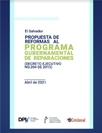Experts estimate that El Salvador’s 12-year armed conflict resulted in around 75,000 deaths, at least 5,000 disappearances, more than 100 displaced people and the entire El Salvadorian population due to the prolonged, overarching impact of the conflict. Most of these crimes remain unpunished to date.
Comprehensive reparations for victims are still a debt unpaid by the government despite the constant demands of victims, as well as national and international human rights organizations. As a result of this pressure, the government created a reparations program, Executive Decree 204, in 2013 where for the first time the government recognized the existence of victims of the armed conflict and created an official registry of victims. Under this program, the government also established four kinds of reparations, namely: rehabilitation measures, economic compensation, satisfaction measures and guarantees of non-repetition.
While the creation of this program was and is considered a historic milestone for victims of the armed conflict, criticism followed shortly after its start not only because of the program’s limited reach and scarce resources, but also for a variety of other issues in effectively implementing the program which, in the long run, has made it impossible to provide adequate and comprehensive reparations to victims.
Understanding this reality, and in consultation with victims, a group of human rights organizations has developed a proposal to reform the Executive Decree 204 aimed at improving the program, hoping that the current administration will implement the reforms to ultimately ensure adequate and comprehensive reparations for victims. This group of organizations formally submitted this proposal to the Ministry of Local Development, who is responsible for running the program.
The proposed reforms include the following:
1. Raise the level of the Board of Directors of the Victim Registry so that there is greater weight in making decisions
2. Include more survivors and families in the Victim Registry.
3. Increase economic compensation for victims.
4. Provide scholarships to children and grandchildren of victims
5. Improve healthcare for victims at all levels, particularly in hospitals
6. Open military archives in order to reveal the truth behind grave human rights violations
7. Advance the assumption of responsibility and requests for forgiveness.
8. Eliminate tributes and monuments to individuals responsible for the crimes during the armed conflict.
[Link to document] Proposal for Reforms to the Executive Decree 204.






